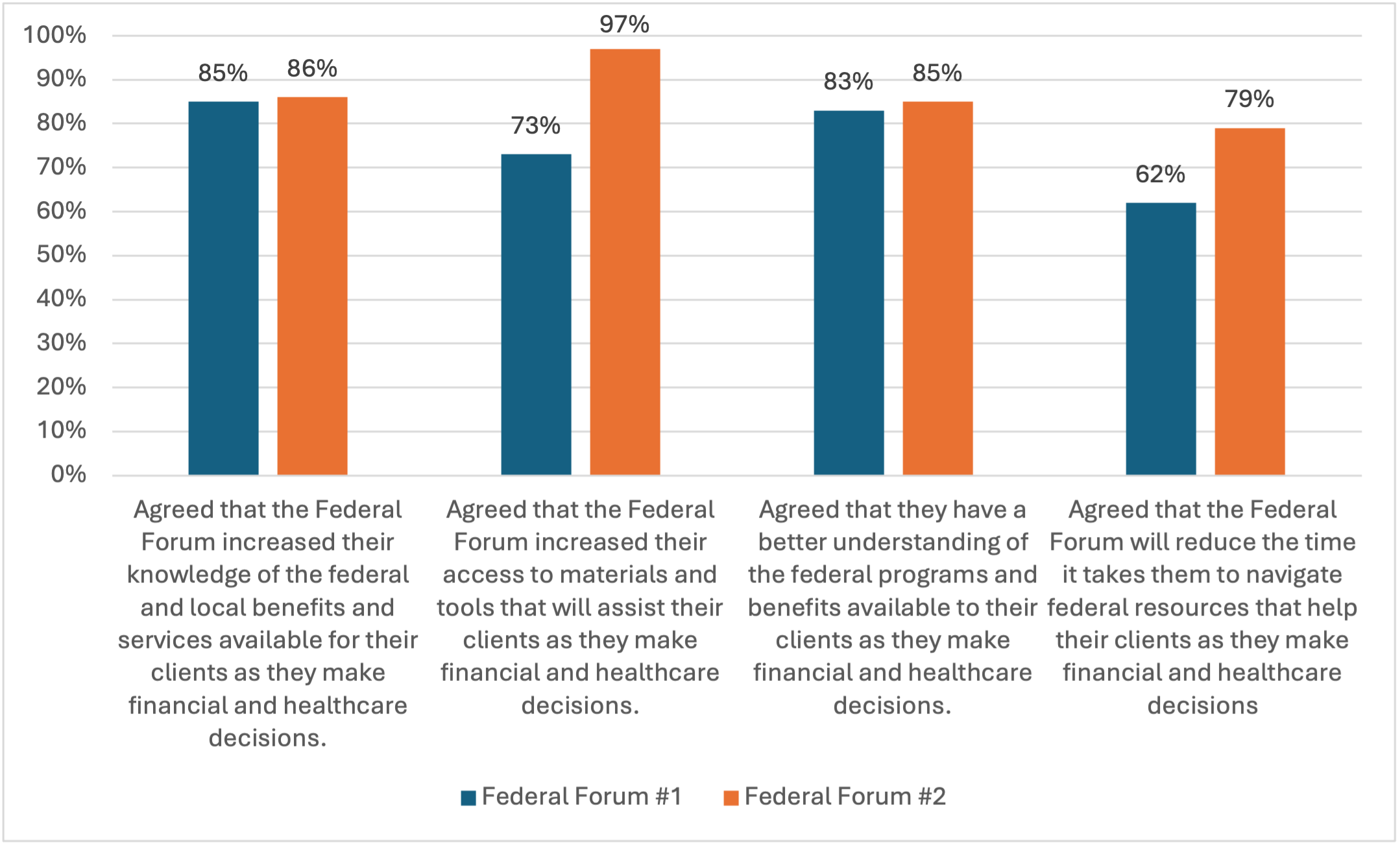The Executive Order on Transforming Federal Customer Experience and Service Delivery to Rebuild Trust in Government directs a whole-of-government approach to improve service delivery for persons during critical moments or Life Experiences. This blog highlights the work of the Approaching Retirement Life Experience team.
Rooted in the specific goal of increasing access to decision-making support for older adults, a cross-agency team led by Administration for Community Living (ACL) of the U.S. Department of Health and Human Services (HHS) worked with six agencies and 15 community-based organizations (CBOs) to co-design and launch two pilots in Spring 2024: a Federal Forum on Serving Older Adults and a series of Federal Decision Support Guides.
The co-design process used to develop the ideas and the details of the Federal Decision Support Guides were covered in a previous blog post.
Creating a Federal Forum to Support Community-Based Organizations
Community-based organizations play a critical, front-line role in helping older adults navigate complex federal programs. Staff at CBOs provide and connect older adults to assistance for a variety of needs such as housing, food, health care, and prescriptions. CBOs are especially critical in lower-income communities where older adults rely on free or low-cost assistance. However, staff turnover, the complexity of information, and the dynamic nature of federal programs and benefits makes it difficult to develop and maintain deep expertise across topics.
Peer-to-peer networking allows staff at CBOs to share learnings and understand changing federal program requirements to best support older adults with limited resources. However, opportunities for this type of convening are time-consuming to organize. As one CBO staff member explained, “A kind of meaningful technical assistance is a convener, to be invited or included makes it easier for me to make those contacts.”
The cross-agency Approaching Retirement team used a participatory design approach with CBOs to develop a Federal Forum. The Forum is designed to connect staff from CBOs and build their knowledge of federal benefits so they can better support older adults in their retirement decisions. By offering targeted presentations on the federal topics that matter to CBO staff and facilitating small group discussions, the Federal Forum makes it easier for CBOs to connect with each other and clarify important program details with federal program leaders.
“When the network is in sync, we get better outcomes for the people.” - front line staff at a CBO
Testing and Piloting the Federal Forum to Meet the Needs of CBO Staff
Before piloting the Federal Forum, the team shared the concept and gathered input from over 300 professionals across the country. Respondents included staff at local community-based organizations, state service providers, and national organizations. Over half of respondents reported working to provide services to older adults for over ten years.
The survey described the Federal Forum as:
- Quarterly virtual convenings of federal agencies and staff from CBOs with the intent of building knowledge related to federal programs and creating an opportunity for peer-to-peer connection.
- Presentations address complex and timely topics not covered in traditional trainings including how federal benefits and programs connect to the on-the-ground needs of low-income older adults and those that serve them.
The feedback showed overwhelming interest in the concept, as 94% of people strongly agreed or agreed that “Participating in this community of practice would better help me serve older adults.”
The Federal Forum’s pilot phase included three events – each evolving by incorporating feedback from the participants of the previous Forum.
The inaugural March 2024 Forum included presentations on the Inflation Reduction Act (IRA) and Medicare, including the expansion of the Low-Income Subsidy or Extra Help. The second, held in June, focused on fraud prevention. The third, held in September, centered on housing. Since each convening topic spans multiple agency programs and services, the team organized collaborative presentations with representatives from ACL, the Consumer Financial Protection Bureau, Centers for Medicare & Medicaid Services, Housing and Urban Development, and the Social Security Administration. While agencies typically work with community partners independently, the Federal Forum’s collaborative presentations from multiple agencies created a unique experience for participants. In addition to creating opportunities for participants to connect with federal agencies, the Federal Forum fostered participant engagement with one another in post-presentation break out rooms.
In response to survey feedback collected after each Federal Forum, the team implemented several suggestions from participants to strengthen relationship-building and improve subsequent convenings:
- More time for learning and connection: Increasing the length of the forum from 60 to 90 minutes to allow for more time in breakout rooms.
- Emphasize community building: Updating outreach materials to more clearly describe breakout rooms as opportunities for peer-to-peer connection.
- Structured facilitation: Providing facilitators with conversation guides and prompts to launch breakout discussions.
The team used input from CBO staff when selecting and framing topics, inviting agency liaisons, and developing agendas to deliver a valuable experience.
Building on Success - The Future of the Federal Forum
Over 380 participants attended one of the three Forums and shared encouragingly positive feedback. Following the June Forum, 97% of respondents agreed that the Federal Forum increased their access to materials and tools that will assist them in helping older adults make informed financial and healthcare decisions. Furthermore, a majority agreed that their participation increased their understanding of federal programs, increased access to materials and tools, and will reduce the time it takes to navigate federal resources.

The team is excited to see how participants carry these newfound resources and relationships forward to support older adults approaching retirement. To learn more about the interagency team, led by ACL, and the Federal Forum pilot, visit the project page here.

